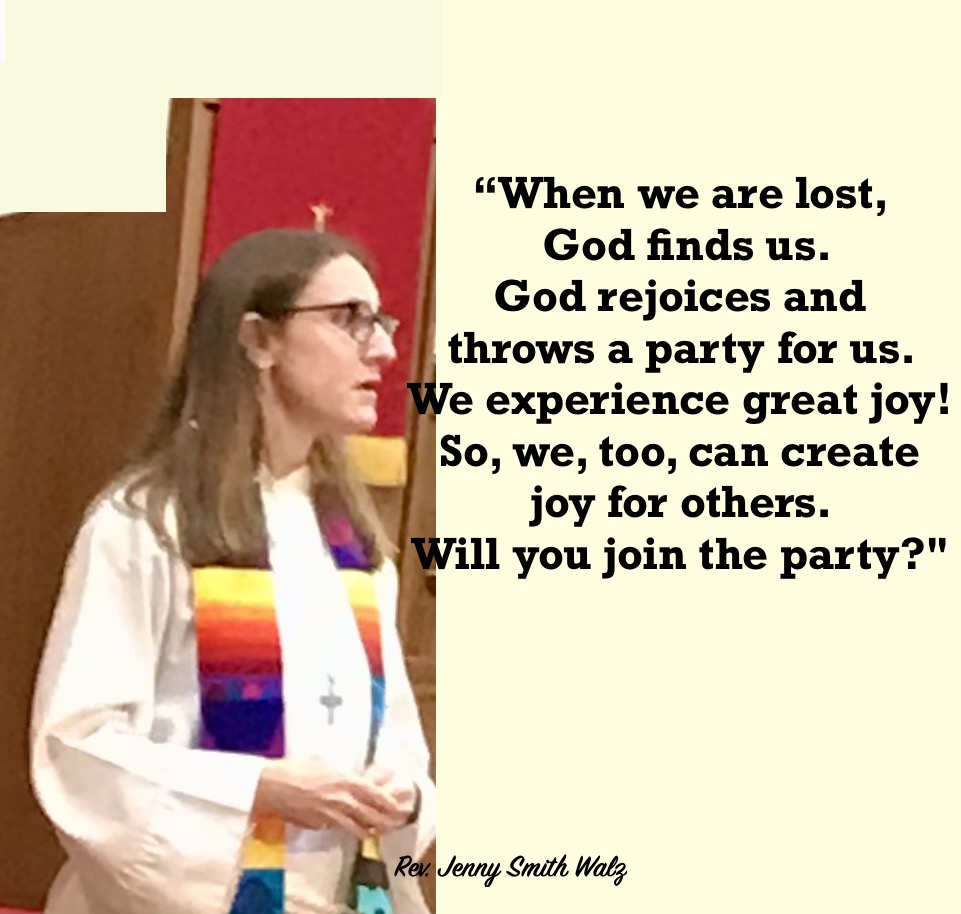Je sus said: I am the resurrection and the life. Those who believe in me, even though they die, will live. We honor the lives of those who have died in the context of Christian faith and hope, says Rev. Catherine Williams, believing that the resurrection is central to our faith, and it is ultimately the words of Jesus Christ that sustain this hope of eternal life beyond death.
sus said: I am the resurrection and the life. Those who believe in me, even though they die, will live. We honor the lives of those who have died in the context of Christian faith and hope, says Rev. Catherine Williams, believing that the resurrection is central to our faith, and it is ultimately the words of Jesus Christ that sustain this hope of eternal life beyond death.
Beyond Death was the topic of Rev. Catherine Williams’ sermon commemorating All Saints Sunday, November 1, 2015. Among her references: Psalm 16:11, Romans 8, 1 , 1 Peter 1 and the Book of Revelation. Her thoughts, she said, turned out to be more of an extended reflection than a sermon. She began with an anecdote.
I had barely begun here as an intern in the fall of 2008; I was standing in the Sanford Davis room after the first service, scanning the room at my eye level when I felt a tug at my robe. I looked down into the sad eyes of a 4th-grader who without any introduction or small talk asked me pointedly, “Where is Mrs. Fullman now?” I scrambled through my mental Rolodex and came up with a Mrs. Fullman who had recently passed away, and who had given outstanding, compassionate leadership to this congregation. I stooped down. My eyes came to the level of those misty pools of brown in that chubby face. “Mrs. Fullman is in heaven now; she is with God,” I said. “Where is heaven?” she shot back. “Well, I said, “some people say it’s up there or out there. We don’t really know where it is, but we know that wherever it is that’s God’s home.” Slight pause…then,“Is that where my dog is too?” There was no escaping the tinge of hope in her voice. I had no dog in my Rolodex, and to be honest, had never given much thought to a theology of animals. In times like these there are two voices in my ears – the rational theologian on my left shoulder and the compassionate pastor on my right. Sometimes they both help me respond well to unexpected questions, but this time my theologian was quiet for a little too long, so following the pastor’s voice I said, “Oh yes, God made the animals and wants them to be with him after they die too.” My inquirer gave me a brief, satisfied smile and disappeared as quickly as she had appeared, leaving me to marvel at the sacredness of that encounter.
When it comes to the subject of life after death we all have thoughts and questions, even if we entertain them only briefly. But like this child, we grapple with these questions mostly in the context of personal loss. When we are about to lose or have lost a loved one, or when we are confronted with our own mortality, it is natural for us to begin thinking about what happens after we die. People have asked questions such as, What do we do in heaven? It sounds boring! Do we spend eternity with those we love or is it one endless cocktail party with millions of souls? Do we have a form in heaven or are we just spirits? What age will I be in heaven? If my mother is there will I recognize her? How good do I have to be to get to heaven?
I remember being with of one of our members the day after the doctors had told her that her body would only continue functioning for another day or so. As I settled in a chair by her bedside she looked me in the eyes and matter-of-factly informed me that she was going to die. How do you feel about that? I asked. She shrugged, “I’m okay.” Pause. Then, ‘how will it happen?’ she wanted to know. The theologian on my left shoulder began her spiel about how no-one really knows, and I had to put her on mute so I could better hear the compassionate pastor on my right shoulder. “It will be beautiful,” I assured her. “Jesus is waiting to welcome you home with open arms.” She nodded and smiled. I’m not sure whether she was humoring me or my answer really resonated with her, but right then in that room I could sense the unmistakable presence of God. I have to tell you that one of the reasons lately I have come to believe heaven is beyond death is because I have sensed the presence of God at so many end of life horizons – anytime I’ve had the opportunity to be with someone just before, at the moment of, or just after their passing, I have witnessed God’s reassuring presence in ways that are humanly difficult to describe. As one of our favorite Affirmations of Faith ends – in life, in death, in life beyond death we are not alone.
Today we commemorate All Saints Sunday. We honor the lives of those who have died, and we do so in the context of Christian hope. Hope has always been vital to the people of God. Our Old Testament lesson from Isaiah is filled with it. Thousands of years before Christ, God’s people learned how to hold on to hope in the midst of a pain-filled existence. Life on earth forced them to look for relief. One such relief was in their hope of a future day where God would vindicate them, deliver them permanently from their national enemies, and be their host around a rich feast of the finest bread and wine. Days of scarcity would be over as God’s abundance would overflow generously. The poetry speaks of God removing the shroud and sheet of death that had been cast over the people. A fitting image for many of our international neighbors today, particularly in the war-ravaged Middle East. The Old Testament Middle Easterners believed God would triumph over death, they declared God would feed them, wipe away all tears from their eyes, and bring them to a place of peace and wholeness in God’s presence. Hope has always been a cherished commodity of our faith.
And it is the writings of Scripture that have not only given birth to our hope down through the ages, Scripture has also fed and sustained this hope. In Psalm 16 the Psalmist sings that in the presence of God there is the fullness of joy. Romans 8 reminds us that it is not only humans who yearn for God’s ultimate salvation but the entire creation groans and waits to be liberated from its bondage to decay. In 1 Corinthians 15 there is a beautiful treatise on death that argues for the resurrection of our glorified bodies. In 1 Peter 1 the apostle fairly sings about this living hope of an ultimate salvation where there is even an inheritance kept in heaven for us. And the writer to the Hebrews puts another spin on this hope by reminding us that as we run this earthly race we are surrounded and encouraged by a heavenly cloud of witnesses that includes people who have died in faith centuries ago.
Then there’s the sublime poetry and prose in the book of Revelation. There the writer has a vision of the Holy City beautifully adorned. But even more than the splendor of the city – even more than streets of gold, walls of jasper, and gates of pearl, the most magnificent aspect of this vision is that it is the place where God dwells among mortals. And the place where mortals call home. When someone asks for my elevator response to the question where is heaven, I say, it is where God is, and where God welcomes the people of God who transition from this life to the next.
We really don’t have adequate language to describe eternal realities. But that doesn’t stop us from using the language we have – to dream, to sing, to reflect on an eternity with a God who loves, deeply, generously, and in whose presence we are forever moving towards wholeness and fulfillment. I prepared for this reflection with my Bible and my hymnal both open. It is no secret that the songs we sing from the base of our operational theology. When it comes to life beyond death we turn to such songs as Abide with Me, with its witness of God’s tenacious grasp on our lives, no matter what the circumstances of our death. We sing songs like When We All Get To Heaven, with its flat-footed assurance that heaven will be worth whatever it takes to get there. We lean on the Spirituals for their earthy yearning for that time when we can steal away to Jesus or be caught up in the heaven-bound chariot that’s swinging low. We might even turn to Natalie Sleeth’s Hymn of Promise that frames our hope in the cycles of death and life found within nature. Hymn of Promise is a hymn that identifies us as people of the resurrection when we sing “In our end is our beginning, in our time infinity, in our doubt there is believing, in our life eternity. In our death, a resurrection, at the last a victory unrevealed until its season, something God alone can see.” Yes! we are people of hope because we are people of the resurrection.
The theologian in my left ear and the pastor in my right are unified that this belief in the resurrection is central to our faith, and to our hope. And it is ultimately the words of Jesus, the Christ, the one whose followers we are, it is those words that sustain this hope of eternal life beyond death. When Jesus said, “I am the resurrection and the life,” he had not yet been crucified. His raising of Lazarus from the dead was a precursor for what he was soon to demonstrate that life and death are a divine cycle where one yields to the other. Yes, there is much about this cycle that remains a mystery. Science has proved and keeps probing, making discoveries at a painfully slow rate. But what if the eternal realities are such that there are no instruments to measure them? We look through a glass dimly as we peer into eternity. Our finite human eyes don’t have the capacity to see into infinity. But our faith – our faith, given to us by God – our faith gives us the capacity to receive the words of Jesus who says, “do not let your hearts be troubled. Believe in God, believe also in me. My Father’s house has many dwelling places, and I am going there to prepare a place for you. I will come back and take you to be with me that where I am you will be there also.” Our God-given faith gives us the capacity to believe the witness of the biblical accounts of the death and resurrection of Jesus who claimed I am the resurrection and the life. Those who believe in me, even though they die, will live. He asks us today as he asked Martha, Do you believe this?
May God grant us the faith of eternal proportions, faith to trust in a God who, in Jesus Christ, lived in death even as he died in life; faith to believe that in life, in death, in life beyond death, God is with us, and we are not alone. Amen.
Written by Isabella Dougan





 sus said: I am the resurrection and the life. Those who believe in me, even though they die, will live.
sus said: I am the resurrection and the life. Those who believe in me, even though they die, will live.